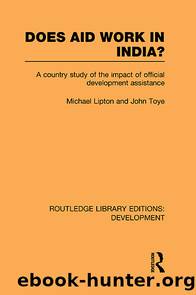Does Aid Work in India? by Lipton Michael;Toye John; & JOHN TOYE

Author:Lipton, Michael;Toye, John; & JOHN TOYE
Language: eng
Format: epub
Tags: Development Studies
Publisher: Taylor & Francis Group
Published: 2010-11-24T00:00:00+00:00
Donor procedures
Since the mid-1970s, donors have become increasingly aware that their own procedures of aid-giving may impose significant avoidable cost on the recipient of aid. By âproceduresâ is meant the whole cycle of political and bureuacratic activity that accompanies the actual transfer of resources. It is a wide-ranging term covering the donor countryâs method of authorizing its aid budget, making aid policy, programming aid by country and sector, project preparation and approval, the actual disbursement of funds, and the ex-post monitoring and evaluation of aid-funded activities. Complying with these procedures requires effort and resources from recipients, in terms of negotiation and documentation. Failing to comply also imposes costs, either in terms of delays to existing projects and programmes, or in terms of lost opportunities of gaining additional foreign resources.
Some of these costs would appear to be imposed unnecessarily. Although these procedures all have the basic aim of the efficient mangement of aid funds, they assume a great variety of different forms as between different donor countries. The supposition must be that some standardization between donors is possible and would be beneficial in reducing recipients negotiation and compliance costs. The standard argument against this has been that standardization of procedures cannot be carried out without very difficult changes in the constitutional frameworks of the donor countries. However, a recent study of the problem concluded that this explanation was not entirely valid, on the grounds that:
During the course of this study, a small number of donors have made changes in their procedures which appeared previously to be impossible from a legalistic point of view (e.g. multi-year commitments, field missions) without major revisions in the bureaucratic or legislative framework of their aid programmes.
(OECD, 1981, 73)
Download
This site does not store any files on its server. We only index and link to content provided by other sites. Please contact the content providers to delete copyright contents if any and email us, we'll remove relevant links or contents immediately.
The Brazilian Economy since the Great Financial Crisis of 20072008 by Philip Arestis Carolina Troncoso Baltar & Daniela Magalhães Prates(138807)
International Integration of the Brazilian Economy by Elias C. Grivoyannis(111057)
The Art of Coaching by Elena Aguilar(53249)
Flexible Working by Dale Gemma;(23292)
How to Stop Living Paycheck to Paycheck by Avery Breyer(19727)
The Acquirer's Multiple: How the Billionaire Contrarians of Deep Value Beat the Market by Tobias Carlisle(12327)
Thinking, Fast and Slow by Kahneman Daniel(12301)
The Radium Girls by Kate Moore(12028)
The Art of Thinking Clearly by Rolf Dobelli(10487)
Hit Refresh by Satya Nadella(9132)
The Compound Effect by Darren Hardy(8965)
Tools of Titans by Timothy Ferriss(8393)
Atomic Habits: Tiny Changes, Remarkable Results by James Clear(8343)
Turbulence by E. J. Noyes(8047)
A Court of Wings and Ruin by Sarah J. Maas(7845)
Change Your Questions, Change Your Life by Marilee Adams(7780)
Nudge - Improving Decisions about Health, Wealth, and Happiness by Thaler Sunstein(7706)
How to Be a Bawse: A Guide to Conquering Life by Lilly Singh(7486)
Win Bigly by Scott Adams(7195)
